- Home
- William H. Keith
Symbionts Page 4
Symbionts Read online
Page 4
With the new course alignments complete, Eagle and the Kasuga Maru slipped back into the blue embrace of the K-T Plenum. The return to Herakles would take another thirty days.
Eagle’s original crew of 310 had left her shorthanded to begin with by a factor of nearly twenty-five percent, and during the past month, a hundred of those had been told off as crews for the five cargo ships and merchants Eagle had captured in three star systems. Shorthanded meant long and frequent watches in the link modules, but it also meant more downtime spent jacked into Eagle’s recreational system. With a month to pass in K-T space, with no way to bleed off the excess heat that day by ship’s day grew more and more oppressive, recreational jacking was a necessity, not a luxury, and not mere entertainment. Without it heat, boredom, and the tedium of routine would have been intolerable.
Dev enjoyed his share of ViRdramas, of course, and lately he’d been downloading literary classics as part of a deliberate attempt to widen his own horizons. He liked ViRsex, too, though instead of solo electronic trysts with AI-generated partners or with the analogues of fellow Eagles, he had a good downloaded copy of Katya Alessandro’s analogue.
Lately, though, even ViRsex with Katya’s image had lost some of its original charm. The program, after all, relied to a large extent on his memories of Katya to make the analogue speak and act convincingly, and the more time he spent with the analogue instead of its flesh-and-blood original, the less spontaneous, the less alive the simulations seemed.
And there was something preying on his mind as well, a problem that had been growing since he’d left Herakles nearly four months earlier. Soon after Eagle dropped back into K-T space, then, Dev spent his off-watch downtime one ship’s evening loading one of the ship’s psych monitor programs.
The setting was a traditional Japanese room—tatami mats, a low table aglow in black lacquer, a viewall simulating a veranda overlooking an enclosed, Japanese garden. Fuji, snowcapped and perfect, rose gracefully above cherry trees beyond a stone wall, a print by Hokusai. Eagle’s monitor programs had been written for her original owners, back when she was still the Tokitukaze, and never been updated.
No matter. Nihonjin or gaijin, shakai or Frontier, people were still people.
“At last,” a voice said. “I was beginning to think that no one aboard this vessel cared to speak with me anymore.”
Dev turned to face the speaker, a small and gray-haired Japanese man, neatly and formally dressed in a traditional white kariginu. The image was that of Ieyasu Sutsumi, though that master of Kokorodo, the way of the mind, had had nothing to do with Eagle’s monitor programming. Sutsumi was a venerable figure; within Nihonjin culture, his age alone made him worthy of respect, and his reputation as both philosopher and teacher was widely known even among gaijin, especially among gaijin who’d had training with Hegemony military forces. Dev had particular reason to remember the man; the real Sutsumi had once sat on a military review board over him, recommending that he be assigned to the leg infantry instead of warstriders because of a bout of technophobia.
“Konichiwa, Sensei,” Dev said, bowing formally. The program would neither care nor react if he ignored the amenities, but observing the formalities made Dev feel more at ease. “I imagine most of the crew feels uncomfortable using a monitor programmed by the enemy.”
One part of himself noted that it was silly apologizing for human behavior to an AI program, as though it felt hurt, lonely, or ignored. Another part acknowledged that it was just as silly for the program to act as though it had missed having conversations with Eagle’s crew, since the program was self-aware, within the definition of artificial intelligence, only when it was running. Still, the value of such interactive software lay in the pretense that it, too, was a human being, as capable of emotion as Dev.
The image folded its legs beneath it in a graceful descent to a tatami. “And you do not?”
Dev lowered himself to a mat opposite the table. “Not really, Sensei. I don’t hate the Japanese. I hate the government, what it’s become.”
“ ‘Hate’ is a strong word, Devsan, and trivialized by misuse. I doubt that many of your compatriots aboard hate anyone in more than an abstract way. I suspect that the reason you are different from them lies in your choice of birthworlds, rather than in your choice of enemies.”
That, Dev reflected, was true enough. Born and raised on Earth, in an outlying enclave of the BosWash metroplex sprawl, he’d grown up in the ever-present shadow of Japanese culture and technology. Though he’d never been part of the shakai, Earth’s dominant, elitist culture, it had been impossible to escape the distinctive reliance on advanced technology displayed by so many of the planet’s citizens. There, even members of the Fukushi, the Imperial welfare program that provided free housing, food, and other services to perhaps two-thirds of the population, possessed the Level One, single-socket implants that let them interact with technic society… and receive government-sponsored information and entertainment downloads. It was much the same on the other Core Worlds, where the populations had enjoyed the status quo of Imperial-Hegemony rule for centuries.
Among the worlds of the Frontier, however, the emphasis was on people, not machines. There was more variety within the populations, too, as well as a stubborn, independent streak that cared less for fashion than for practicality. A person was more likely to work his own problems out than to rely on the help of an AI monitor program.
“So. Why are you here?” Sutsumi’s image asked.
Dev took a breath before answering. The illusion of reality was perfect in every way; the breath steadied him, stilled some part of the doubt and fear that had brought him here, exactly as though it had been a real breath drawn by his flesh-and-blood body.
“Sensei. I need a check on my TM rating. I… When we took the Kasuga Maru, I felt like I was close to the edge. Again.” He ran one hand through his hair. Again, the illusion was perfect. He felt the ceramic slickness of his right temporal socket beneath his fingertips.
“Ah.” Sutsumi’s eyes narrowed, as though he were studying Dev closely. “Let me have a closer look.”
Inwardly, Dev sensed the flux and tickle of circuits opening and closing, of personal RAM being sampled, of neurons firing. Within the space of two heartbeats, he felt cold, then hot, smelled cinnamon, tasted salt, heard the tinkling echo of crystal bells. For the briefest of instants he was a warstrider, two-meter duralloy legs scissoring across a landscape of battle-torn earth and shattered buildings. Power thrilled.…
“We would need a high-level diagnostic for a full-confidence reading, of course,” Sutsumi said. “But a quick reading of your psych index gives a TM of point four. That is normal for you, Devsan, neh?”
“Normal for me.Yeah.”
The development of cephlink technology had brought its own zoo of ills and mental conditions, from people with physiologies that simply could not tolerate chips and circuits grown within their brains, to those who rejected them on esthetic, political, or religious grounds. Dozens of psychotechnic disorders, mental problems triggered by link technology, had been identified. Three—technic depression, technophobia, and technomegalomania—were so prevalent that everyone with link hardware was given a rating on a decimal scale of zero to one indicating his or her susceptibility to PTDs.
As with a drug, the effects of TM, technomegalomania, could be obvious or subtle. It could make a linked person euphoric, or it could act like a depressant when he was not linked. For some, the feelings of godlike power when they were linked to an AI or to link-driven equipment or simply while they experienced the illusion of ViReality could be overwhelming.
For some professions—jacking a military warstrider, for instance—a high TM rating was not a handicap. For piloting a starship, however, where a lapse in judgment could wreck the vessel and kill the entire crew, feelings of godlike power were not thought of as valuable assets. Riding the currents of the K-T Plenum, a starship was balanced in a tiny, self-generated pocket universe, adrift on the in
terface between normal fourspace and the quantum sea. Modern cosmology viewed the entire physical universe as no more than a four-dimensional bubble floating atop a polydimensional ocean of energy, the godsea. A mistake in judgment while riding the godsea currents, and Eagle’s eighty-four-thousand-ton mass would be transformed instantly into energy; against such furies as those a starship rode, the mass-to-energy translation would yield not even a flicker of incandescence.
For that reason, the Hegemony Navy, as Dev had ample personal reason to remember, did not admit people with TM ratings higher than point two. They wanted calm and dispassionate jackers with sound judgment who could make reasoned decisions under pressure. The independent merchant lines—and organizations as desperate for experienced shipjackers as the Confederation Navy—were not nearly so picky, how-ever.
Dev Cameron, son of a starship captain, had yearned to be a shipjacker himself for as long as he could remember. He’d jacked aboard a freighter for a time, but when he’d tried joining the Hegemony Navy nearly four years ago, his TM rating of point four had blocked him. He’d ended up as leg infantry, then as a warstrider.
The war and the rebel Confederation’s need for ships and men who could jack them had given him another chance, though, and after leading the warstrider assault team that had captured the Tokitukaze, he’d found his lifelong dream of commanding a starship to have become reality.
He still had that point four TM rating, though, and every time he jacked into Eagle’s command link he felt that familiar-yet-new thrill coursing through his being, a kind of head-spinning glory that came with riding the godsea, with tricking the cosmos into doing his bidding. Worse, he felt the same thrill during combat, a surging, exultant, and terrifying sense of invincibility.
So far, he’d held those feelings rigidly in check, mostly by clinging to the realization of just how many lives depended on his rational assessment of things both within the K-T Plenum and in combat. But things had happened to him within the past few months that had pushed him beyond the limits he’d set for his own emotions.
There were medtechs aboard the Eagle, and even several human psychotechnicians, but he didn’t want anyone to know what was going on within his own thoughts and perceptions and memory just now. He didn’t want to look closely at them himself, either, though he knew that if he didn’t, things would only get worse until he made a bad and possibly fatal mistake. That was why he’d sought out the anonymous comfort of the ship’s AI psych monitor. The record of what went on here was private, accessible only by his personal RAM codes or by those authorized by a military court.
He was glad of that confidentiality. Dev didn’t want anybody to know just how scared he was.
“You have had some rather strange experiences recently,” the Sutsumi analogue said.
Dev started, looked up. His thoughts had been wandering. “Huh?”
“You had an unusual encounter,” the analogue said. “And I have the feeling that it is at least partly responsible for this atypical lack of confidence in yourself. Perhaps you’d like to discuss what happened.”
“Um. You mean the Heraklean Xenophobe.” He shrugged. “The word ‘like’ isn’t exactly applicable. But I guess I have to.”
“You don’t have to do anything, Devsan. But if it would make you feel better…”
Dev smiled ruefully. Once, years ago, he’d downloaded a history of the development of artificial intelligence. One of the earliest experiments in that high-tech realm had been an interactive program called “Liza” that simulated the give and take between a psychiatrist and a patient. “My father doesn’t like me.” “Why do you say your father doesn’t like you?” The conversations, such as they were, had depended on the program’s use of key words that it fed back to the patient in questions designed to elicit more statements. The program had not been self-aware, not even in the limited fashion that Eagle’s monitor program was self-aware, and by modern standards the psychiatric practices it had emulated were scarcely a step removed from arrant superstition.
Still, people who’d interacted with Liza had reported feeling much better after discussing their problems with it. Dev suspected that the Sutsumi analogue was pushing him in the same direction. “A problem shared,” ran the old saying, “is a problem halved.”
“On Herakles,” Dev told the sensei, “I, uh, linked with a Xenophobe. With a Naga, I mean.” He still wasn’t used to the new name for the alien intelligences. “I’d communicated with two other Nagas before, one out in the Alyan system, one on Eridu, but this was something… very different.”
Sutsumi waited patiently, listening, legs folded on the tatami.
“We still don’t know what happened, really,” he went on. “Not the medtechs, not Confederation Military Command. Not even me, and I was there. Somehow, that Xeno and I joined so completely that we really were a new… entity.” Xenolink, the AI and medical experts were calling that blending of human and Naga.
“Symbiosis,” Sutsumi suggested. “Two organisms functioning together in a way complementary to both.”
“Maybe. While I was linked to the thing, I could see and feel with its senses, while it could see and hear with mine. Xenos don’t have sight or hearing, you know, though they have plenty of senses that we don’t. They can taste magnetism in rock. Feel electrons moving like sand trickling through your fingers. I felt all of that, though I still don’t understand it any more than a blind man understands blue. And I had access to… its past. Its memories.” He shuddered. “They’re still with me, though I’m damned if I can make much of anything out of them.”
“You were thoroughly checked out afterward by medtechs and somatic specialists, were you not?”
“Sensei, you don’t know the half of it. Though I’m still not sure whether anybody believes my story. Hell, I’m not sure I do. But it doesn’t matter. While I was plugged into the Naga, an Imperial squadron attacked. They surprised us, came out of K-T space so close to the planet we were caught in the open, naked, almost defenseless. They had us, Sensei. But I… I stopped them.”
“How did you stop them, Devsan?”
“By throwing rocks. I knocked them out of orbit by throwing rocks.”
Sutsumi’s image blinked once at that, and Dev smiled. Long before Man had first left his homeworld there’d been speculation about using asteroids nudged out of orbit or material scooped from the surface of the moon as weapons literally unstoppable if dropped toward a world’s surface from the top of its gravity well.
At Herakles, though, the fusion of Dev and Naga had reversed that equation. By generating intense, swiftly moving magnetic fields, he/they had plucked one-ton masses of iron and Rogan-Process building material from the facing of an atmosphere generator and hurled them into space at one-tenth of the speed of light. Imperial warships caught by that barrage, even one of the monster Ryu-class carriers, had been vaporized, like gnats touched by the breath of a laser cutting torch.
Either the monitor program had been following his thoughts or it had just accessed records of the battle at Herakles. “The transitional kinetic energy released by the impact of a one-ton mass moving at ten percent c,” Sutsumi said, “is approximately 1019 joules. The equivalent of thousands of high-yield thermo-nuclear explosions. How did you feel, wielding such power?”
Dev closed his eyes, but in his memory he saw again the cloud-wracked sky, sensed the Imperial ships overhead. Lightnings fork from the crest of an artificial mountain. Thunder peals. He exerted himself so.… Overhead, the sky turns white, an illumination more dazzling than the brassy, subgiant’s glare of the Heraklean sun. Another ship dies.…
“I don’t think I’ll ever be free of the… feeling,” Dev said. “I think it changed me. Like I can never go back to what I was.”
“But you did. You broke your link with the Naga.”
“Yes.” He’d had to. He’d been terrified of losing his humanity. Sometimes he wondered if he was still entirely human. There were times…
Lightning flared.
Behind… beneath him, the Naga’s mind was a murmuring sea, voices, dream-memories, and above all, the power of a storm-torn sea.…
Later, when the Naga was gone, there was such… loneliness.
“I’ve been worried, Sensei,” he told the analogue. “Especially when I’m linked, in combat, or while jacking a starship. I’m afraid of taking chances that just can’t be justified. Of losing… control.”
“Give me a specific example.”
“Okay. At New America, when we took Kasuga Maru. I decided to gamble, to play the part of a Juanyekundan shipjacker to scare the enemy into surrender.”
“The ploy worked.”
“Yes. Yes, it did. Then I went on and bluffed the skipper of the Kasuga Maru.”
“Bluff and deception are important aspects of successful military tactics.”
“Sure, but don’t you see? I wasn’t even thinking about the possibility of failure. If the bluffs had failed, well, I’m afraid I was ready to push ahead anyway. Even though that could have meant Eagle was destroyed. It’s like a storm inside my brain when I link in and I’m riding the percentages. Like the burn of a jolt addict.”
There were people who used their cephlinks to commit suicide, intentionally or accidentally, by channeling electronic stimulation directly into the pleasure centers of their brains. PC stimulation—whether through hardwired implants or injections of programmed nano—could destroy a person in months, even in days if he had unlimited access to the technology and lacked the power of will to resist its siren’s call. Most victims died of thirst, so powerful were the cravings for the better-that-orgasms that went on and on and on. Some tried to stop short of death and found they could no longer live without it—jolt addicts and brain burners.

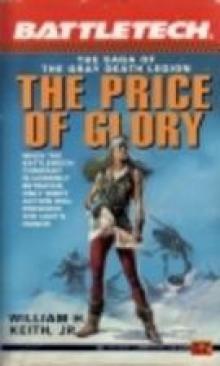 The Price of Glory
The Price of Glory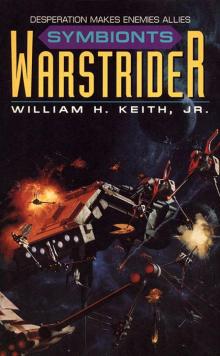 Symbionts
Symbionts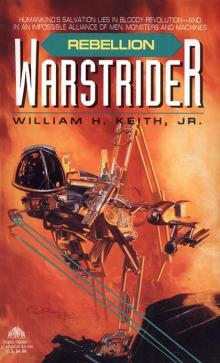 Rebellion
Rebellion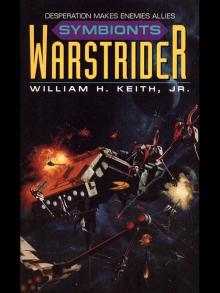 Warstrider 04 - Symbionts
Warstrider 04 - Symbionts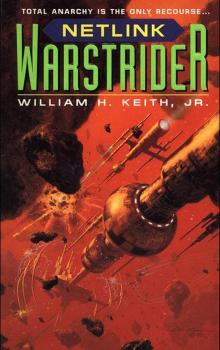 Netlink
Netlink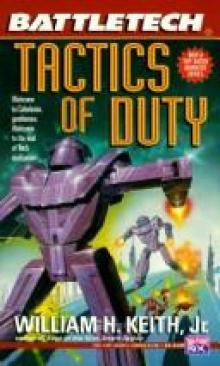 Tactics of Duty
Tactics of Duty Warstrider 06 - Battlemind
Warstrider 06 - Battlemind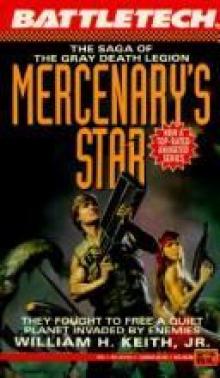 Mercenary's Star
Mercenary's Star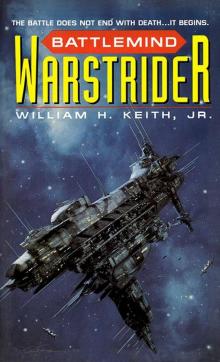 Battlemind
Battlemind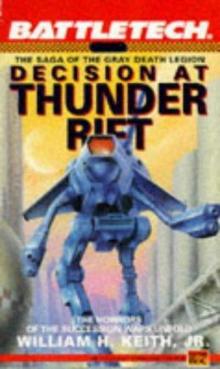 Decision at Thunder Rift
Decision at Thunder Rift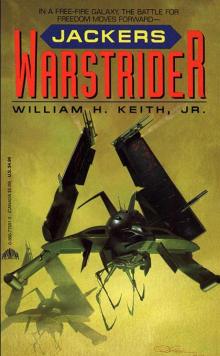 Jackers
Jackers Android: Free Fall
Android: Free Fall Warstrider 01 - Warstrider
Warstrider 01 - Warstrider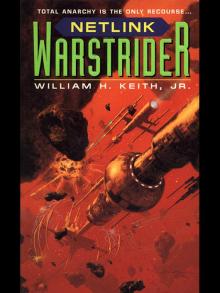 Warstrider 05 - Netlink
Warstrider 05 - Netlink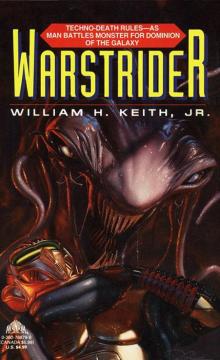 Warstrider
Warstrider